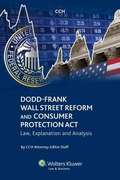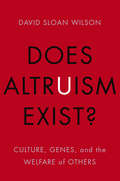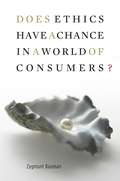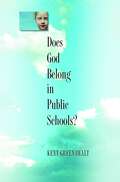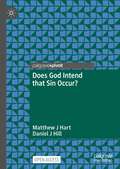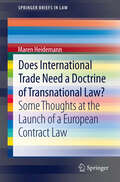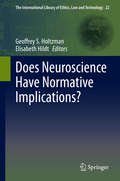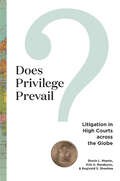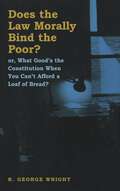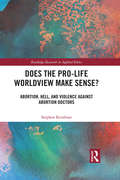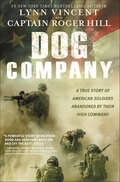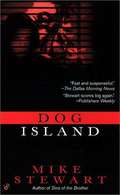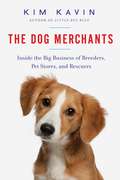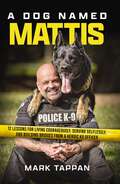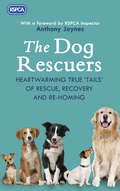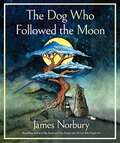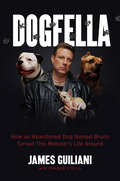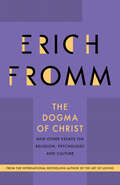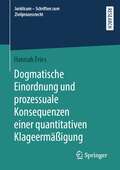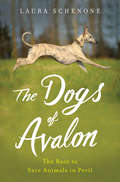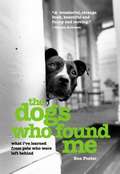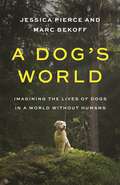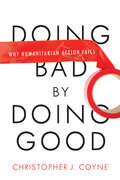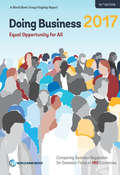- Table View
- List View
Dodd-Frank Wall Street Reform and Consumer Protection Act: Law, Explanation and Analysis
by Cch IncorporatedDodd-Frank Wall Street Reform and Consumer Protection Act: Law, Explanation and Analysis provides comprehensive analysis of this sweeping new banking and securities legislation. Passed by the House of Representatives on June 30 and by the Senate on July 15, the Dodd-Frank Wall Street Reform and Consumer Protection Act was signed into law by the President on July 21,2010.
Does Altruism Exist?
by David Sloan WilsonDavid Sloan Wilson, one of the world’s leading evolutionists, addresses a question that has puzzled philosophers, psychologists, and evolutionary biologists for centuries: Does altruism exist naturally among the Earth’s creatures? The key to understanding the existence of altruism, Wilson argues, is by understanding the role it plays in the social organization of groups. Groups that function like organisms indubitably exist, and organisms evolved from groups. Evolutionists largely agree on how functionally organized groups evolve, ending decades of controversy, but the resolution casts altruism in a new light: altruism exists but shouldn’t necessarily occupy center stage in our understanding of social behavior. After laying a general theoretical foundation, Wilson surveys altruism and group-level functional organization in our own species—in religion, in economics, and in the rest of everyday life. He shows that altruism is not categorically good and can have pathological consequences. Finally, he shows how a social theory that goes beyond altruism by focusing on group function can help to improve the human condition in a practical sense. Does Altruism Exist? puts old controversies to rest and will become the center of debate for decades to come.
Does Ethics Have a Chance in a World of Consumers? (Institute for Human Sciences Vienna Lecture Series)
by Zygmunt BaumanZygmunt Bauman is one of the most admired social thinkers of our time. Once a Marxist sociologist, he has surrendered the narrowness of both Marxism and sociology, and dares to write in language that ordinary people can understand—about problems they feel ill equipped to solve. This book is no dry treatise but is instead what Bauman calls “a report from a battlefield,” part of the struggle to find new and adequate ways of thinking about the world in which we live. Rather than searching for solutions to what are perhaps the insoluble problems of the modern world, Bauman proposes that we reframe the way we think about these problems. In an era of routine travel, where most people circulate widely, the inherited beliefs that aid our thinking about the world have become an obstacle. Bauman seeks to liberate us from the thinking that renders us hopeless in the face of our own domineering governments and threats from unknown forces abroad. He shows us we can give up belief in a hierarchical arrangement of states and powers. He challenges members of the “knowledge class” to overcome their estrangement from the rest of society. Gracefully, provocatively, Bauman urges us to think in new ways about a newly flexible, newly challenging modern world. As Bauman notes, quoting Vaclav Havel, “hope is not a prognostication.” It is, rather, alongside courage and will, a mundane, common weapon that is too seldom used.
Does God Belong in Public Schools?
by Kent GreenawaltControversial Supreme Court decisions have barred organized school prayer, but neither the Court nor public policy exclude religion from schools altogether. In this book, one of America's leading constitutional scholars asks what role religion ought to play in public schools. Kent Greenawalt explores many of the most divisive issues in educational debate, including teaching about the origins of life, sex education, and when--or whether--students can opt out of school activities for religious reasons. Using these and other case studies, Greenawalt considers how to balance the country's constitutional commitment to personal freedoms and to the separation of church and state with the vital role that religion has always played in American society. Do we risk distorting students' understanding of America's past and present by ignoring religion in public-school curricula? When does teaching about religion cross the line into the promotion of religion? Tracing the historical development of religion within public schools and considering every major Supreme Court case, Greenawalt concludes that the bans on school prayer and the teaching of creationism are justified, and that the court should more closely examine such activities as the singing of religious songs and student papers on religious topics. He also argues that students ought to be taught more about religion--both its contributions and shortcomings--especially in courses in history. To do otherwise, he writes, is to present a seriously distorted picture of society and indirectly to be other than neutral in presenting secularism and religion. Written with exemplary clarity and even-handedness, this is a major book about some of the most pressing and contentious issues in educational policy and constitutional law today.
Does God Intend that Sin Occur?
by Matthew J Hart Daniel J HillThis open access book argues, from a detailed consideration of the Christian Scriptures, that God intends that sin occur. It swims against the tide of current thinking in philosophy of religion, arguing for an unfashionable conclusion. The book begins by considering the history of views on the question, paying particular attention to the Reformed or Calvinistic tradition. The heart of the book is a detailed examination of key passages from the Christian Scriptures that, it is argued, show that God does intend that sin occur. It also discusses in detail two alternative views that could be used to reinterpret these texts, one view that God intends only that the substratum of the sinful action occur, not the sin itself, and the other that God acts because a sin will occur but not intending that that sin occur. The book argues that these interpretative strategies, even when combined together, do not produce a plausible interpretation of the texts adduced.
Does International Trade Need a Doctrine of Transnational Law?
by Maren HeidemannThis paper looks at the current status and role of specific commercial contract law both national and international in view of recent European contract law reform. It reviews the value and necessity of a special and separate contract law for merchants in a global market and discusses critically the terminology, doctrine and objectives which this law is based upon. For a long time the choice of transnational law rules which are often non-state law has been marginalised and made impossible in state court proceedings. The new Common European Sales Law circumvents this problem by proposing to be used as national law. International practice in commercial dispute settlement may therefore still remain at the forefront of promoting and modelling the use of transnational contract law.
Does Neuroscience Have Normative Implications? (The International Library of Ethics, Law and Technology #22)
by Geoffrey S. Holtzman Elisabeth HildtThis book brings together a number of essays that are optimistic about the ways certain neuroscientific insights might advance philosophical ethics, and other essays that are more circumspect about the relevance of neuroscience to philosophical ethics. As a whole, the essays form a self-reflective body of work that simultaneously seeks to derive normative ethical implications from neuroscience, and to question whether and how that may be possible at all. In doing so, the collection brings together psychology, neuroscience, philosophy of mind, ethics, and philosophy of science. Neuroscience seeks to understand the biological systems that guide human behavior and cognition. Normative ethics, on the other hand, seeks to understand the system of abstract moral principles dictating how people ought to behave. By studying how the human brain makes moral judgments, can philosophers learn anything about the nature of morality itself? A growing number of researchers believe that neuroscience can, indeed, provide insights into the questions of philosophical ethics. However, even these advocates acknowledge that the path from neuroscientific is to normative ethical ought can be quite fraught.
Does Privilege Prevail?: Litigation in High Courts across the Globe (Constitutionalism and Democracy)
by Stacia L Haynie Kirk A Randazzo Reginald S SheehanThe first transnational comparative study of legal party capability theory Justice is supposed to be blind. Cynics will say they know better. But what do the facts say? This groundbreaking study provides objective, data-driven answers to long-standing questions about winners and losers in courtrooms across the world. Does the party with the greater resources, such as money and influence, always prevail—and if so, why? Does Privilege Prevail? is the first book to evaluate these questions using a multi-country approach and, in doing so, assess what legal professionals and political scientists call party capability theory. Stacia Haynie, Kirk Randazzo, and Reginald Sheehan analyze over fifteen thousand litigation outcomes of the high courts of six countries—Australia, Canada, India, the Philippines, South Africa, and the United Kingdom—from 1970 to 2000. This unprecedented trove of data reveals that while the &“haves&” of society do undoubtedly enjoy certain advantages in the judicial system, a more complex explanation for legal outcomes is required than party capability theory provides—especially when it comes to assessing the role of attorneys and their legal teams or the components of the docket where judges can provide avenues for the &“have nots&” to succeed.
Does the Law Morally Bind the Poor?: Or What Good's the Constitution When You Can't Buy a Loaf of Bread? (Critical America #35)
by R. George WrightConsider the horror we feel when we learn of a crime such as that committed by Robert Alton Harris, who commandeered a car, killed the two teenage boys in it, and then finished what was left of their lunch. What we don't consider in our reaction to the depravity of this act is that, whether we morally blame him or not, Robert Alton Harris has led a life almost unimaginably different from our own in crucial respects. In Does Law Morally Bind the Poor? or What Good's the Constitution When You Can't Buy a Loaf of Bread?, author R. George Wright argues that while the poor live in the same world as the rest of us, their world is crucially different. The law does not recognize this difference, however, and proves to be inconsistent by excusing the trespasses of persons fleeing unexpected storms, but not those of the involuntarily homeless. He persuasively concludes that we can reject crude environmental determinism without holding the most deprived to unreasonable standards.
Does the Pro-Life Worldview Make Sense?: Abortion, Hell, and Violence Against Abortion Doctors (Routledge Research in Applied Ethics)
by Stephen KershnarThis book looks at a family of views involving the pro-life view of abortion and Christianity. These issues are important because major religious branches (for example, Catholicism and some large branches of Evangelicalism) and leading politicians assert, or are committed to, the following: (a) it is permissible to prevent some people from going to hell, (b) abortion prevents some people from going to hell, and (c) abortion is wrong. They also assert, or are committed to, the following: (d) it is permissible to use defensive violence to prevent people from killing innocents, (e) doctors who perform abortions kill innocents, and (f) it is wrong to use defensive violence against doctors who perform abortions. Stephen Kershnar argues that these and other principles are inconsistent. Along the way, he explores the ways in which theories of hell, right forfeiture, and good consequences relate to each other and the above inconsistencies.
Dog Company: A True Story of American Soldiers Abandoned by Their High Command
by Lynn Vincent Roger HillNow with a forward by Sean Hannity, this powerful story of brotherhood, bravery, and patriotism exposes the true stories behind some of the Army's darkest secrets. The Army does not want you to read this book. It does not want to advertise its detention system that coddles enemy fighters while putting American soldiers at risk. It does not want to reveal the new lawyered-up Pentagon war ethic that prosecutes U.S. soldiers and Marines while setting free spies who kill Americans.This very system ambushed Captain Roger Hill and his men.Hill, a West Point grad and decorated combat veteran, was a rising young officer who had always followed the letter of the military law. In 2007, Hill got his dream job: infantry commander in the storied 101st Airborne. His new unit, Dog Company, 1-506th, had just returned stateside from the hell of Ramadi. The men were brilliant in combat but unpolished at home, where paperwork and inspections filled their days.With tough love, Hill and his First Sergeant, an old-school former drill instructor named Tommy Scott, turned the company into the top performers in the battalion. Hill and Scott then led Dog Company into combat in Afghanistan, where a third of their men became battlefield casualties after just six months. Meanwhile, Hill found himself at war with his own battalion commander, a charismatic but difficult man who threatened to relieve Hill at every turn. After two of his men died on a routine patrol, Hill and a counterintelligence team busted a dozen enemy infiltrators on their base in the violent province of Wardak. Abandoned by his high command, Hill suddenly faced an excruciating choice: follow Army rules the way he always had, or damn the rules to his own destruction and protect the men he'd grown to love.
Dog Island (Tom McInnes #2)
by Mike StewartAttorney sleuth Tom McInnes pits wits against stone-cold killers who would rather commit murder than leave witnesses. When a teenage runaway she has befriended witnesses a brutal murder, Susan Fitzsimmons puts in a call to her lawyer-friend, Tom McInnes. Tom makes a cursory inquiry through the local sheriff's office, only to trigger unexpectedly swift and forceful retaliation: His office is broken into and armed gunmen lay siege to Susan's house. The situation deteriorates as Tom and those close to him stir up several hornet's nests' worth of trouble across the Florida panhandle on their way to a deadly showdown.
The Dog Merchants: Inside the Big Business of Breeders, Pet Stores, and Rescuers
by Kim KavinWe love them with all our hearts, but do we really know where our dogs came from? Kim Kavin, author of Little Boy Blue, reveals the complex network behind the $11 billion-a-year business of selling dogs. A must-read for the benefit of all dogs, everywhere. In what promises to become an "Omnivore's Dilemma" for dog lovers--breed devotees and adoption advocates alike--The Dog Merchants is the first book to explain the complex and often surprisingly similar business practices that extend from the American Kennel Club to local shelters, from Westminster champions to dog auctions. Without judging dog lovers of any stripe, The Dog Merchants makes it clear that money spent among these dog merchants has real-world effects on people and canines. Kavin reveals how dog merchants create markets for dogs, often in defiance of the usual rules of supply and demand. She takes an investigative approach and meets breeders and rescuers at all levels, shedding much-needed light on an industry that most people don't even realize is an industry. Kavin's goal is to advance the conversation about how all dogs are treated, from puppy mills to high-kill shelters. She shows that a great deal can be improved by understanding the business practices behind selling dogs of all kinds. Instead of pitting rescue and purebred people against each other, The Dog Merchants shows how all dog lovers can come together, with one voice as consumers, on behalf of all our beloved companions.
A Dog Named Mattis: 12 Lessons for Living Courageously, Serving Selflessly, and Building Bridges from a Heroic K9 Officer
by Mark TappanTake a ride-along with Sergeant Mark Tappan and his amazing K9 partner Mattis, whose heroic actions will inspire you to live courageously, serve selflessly, and love passionately because every human (and dog) has a purpose.Sergeant Mark Tappan shares a unique bond with his K9 partner Mattis, one of the most decorated police K9s of all time. Mark knew from the first time they interacted that Mattis was something special. As a man of deep faith, Mark also knew that God's most profound teaching often comes through the most unexpected sources, and he soon realized that Mattis was going to teach him about loyalty, selfless service, and so much more.In A Dog Named Mattis, Mark shares twelve life lessons he's learned from working with Mattis. Through these first-hand accounts of bravery and service, you will learn profound lessons, like:being willing to 'go all in' and work with all your heart even when things are uncertain,how persistence pays off when you are willing to stick with what you know is right,how to be strong and courageous in the face of adversity,and much more. You will also get a behind-the-scenes look at the world of police K9s and gain a deeper understanding of:the many ways that K9 units assist police departments,what a K9 officer's daily life looks like,what kind of training police dogs and their handlers must go through,how a police dog is tested and selected,and the lengths a dog will go to in order to complete their mission. A Dog Named Mattis will capture the hearts of dog lovers everywhere and remind you that true success is built on relationships filled with trust, communication, and love.
The Dog Who Couldn't Wag his Tail
by Linda AdkinsWhen his rescuer saw him on the side of the road, the poor swollen dog, needed a lot of help. He had terrible ear mites, and no hair except for a couple of tufts on his face. The dog could not even wag his tail. But with some kind caring vets and a chance to get better [and] learn a few tricks, "Mighty Mite," a golden retriever mix, was able to make a difference as a blood donor for other animals in need and as a therapy dog. This is his true story.
The Dog Who Followed the Moon
by James NorburyFrom the international bestselling author and illustrator of Big Panda and Tiny Dragon and The Cat Who Taught Zen comes a beautifully illustrated adult fable of a lost young puppy, the old wolf who rescues her, and their journey to follow the moon—with meditations on friendship, connection, and sacrifice.Deep in the mountain forests, a young pup named Amaya wanders lost and alone, until an aging wolf rescues her from a terrifying encounter with his vicious pack. To try and reunite Amaya with her parents, the unlikely pair embark on a journey to follow the moon.Eerie woods, forgotten cities, and other obstacles await Amaya and the Wolf on their adventure. As they make their way through the wilderness, the two learn profound lessons about love, sacrifice, and the importance of embracing change.Featuring stunning artwork from bestselling author and illustrator James Norbury, The Dog Who Followed the Moon is a moving, poignant reflection on love and loss, grief and growth.
Dogfella: How an Abandoned Dog Named Bruno Turned This Mobster's Life Around -- A Memoir
by James GuilianiHow did a former mob enforcer become a compassionate advocate for animals in need of loving homes? How did his hardened heart open up to the plight of abused and abandoned pets? James "Head" Guiliani was an unlikely candidate to become a passionate animal rescuer. Raised in a religious family in a blue-collar neighborhood, James became involved in street gangs at a young age. By his mid-twenties, he'd become a 6'2" 250-pound enforcer for the Gambino crime family during the reign of infamous mob boss John Gotti. But after years of worsening alcohol and drug use and a stretch in the Riverhead Correctional Facility, James finally hit bottom. It was then that he met Lena Perrelli, who helped turn his life around, providing the love and support he'd rejected in the past. And when the couple rescued an abandoned and abused shih tzu, the second phase of James's salvation began. Lovingly named Bruno, the small dog opened the former enforcer's hardened heart, and James discovered a new purpose in life as a devoted animal rescuer. Dogfella tells how this onetime altar boy from Queens became a gang member, a mob confidante, an an addict and convicted felon--and how he found redemption by dedicating his life to animals. Alongside his personal journey, James shares stories from his rescue missions with Keno's Animal Rescue Shelter in Brooklyn: saving pit bulls from a dogfighting ring, driving through six-foot snowdrifts to reach 200 cats stranded in a blizzard, taking in homeless ducks from Staten Island, and many more. Sometimes scary, sometimes funny, and often poignant, James's story shows how the love of an animal can bring even the most hopeless cases a new purpose and a path to redemption.
The Dogma of Christ: And Other Essays on Religion, Psychology and Culture (Routledge Classics Ser.)
by Erich Fromm&“Fromm&’s developing thought merits the critical attention of all concerned with the human condition and its future.&” —The Washington Post The essays in this fascinating volume examine present-day psychological and cultural problems with the keen insight and humanistic sympathies characteristic of Erich Fromm&’s work.The Dogma of Christ provides some of the sharpest critical insights into how the contemporary world of human destructiveness and violence can no longer separate religion, psychology, and politics. The book brilliantly summarizes Fromm&’s ideas on how culture and society shape our behavior. &“It&’s the new post-religious theme song. The Fromm exhortations are imaginative and he has a definite audience.&” —Kirkus Reviews &“Of all the psychological theorists who have tried to formulate a system better than Freud&’s to approach problems of contemporary life, no one has been more creative or influential than Erich Fromm. He is the most articulate advocate on the role of social forces in molding our character and on our manner of relating to others. This volume is an expansion of his systematic doctrine.&” —Louis L. Lunsky, MD, Archives of Internal Medicine
Dogmatische Einordnung und prozessuale Konsequenzen einer quantitativen Klageermäßigung (Juridicum - Schriften zum Zivilprozessrecht)
by Hannah FriesBereits seit Ende des 19. Jahrhunderts beschäftigt sich die Wissenschaft mit der Frage der Behandlung der quantitativen Klageermäßigung im Sinne von § 264 Nr. 2 ZPO. Ausgangspunkt dieser Frage ist der Befund, dass eine quantitative Klageermäßigung – die Reduzierung des Klageantrags in seiner Höhe – sowohl Elemente einer Klageänderung als auch einer Klagerücknahme enthält. Diese Arbeit fasst den aktuellen Forschungsstand zu dieser Frage zusammen und entwickelt einen eigenen Lösungsvorschlag, welcher auf der dogmengeschichtlichen Wurzel von § 264 Nr. 2 ZPO beruht und auch die prozessualen Konsequenzen einer quantitativen Klageermäßigung berücksichtigt.
The Dogs of Avalon: The Race to Save Animals in Peril
by Laura SchenoneAfter adopting an Irish sight hound, Laura Schenone discovers a remarkable and little-known fight to gain justice for dogs and for all animals. Greyhounds, bred to be the fastest racing dogs on earth, are streaks of lightning. Beautiful, astonishing creatures, countless numbers of them disappear each year once they can no longer compete and win. The Dogs of Avalon introduces us to the strong-willed Marion Fitzgibbon, born in rural Ireland, where animals are valued only for their utility. But Fitzgibbon believes that suffering is felt by all creatures, and she champions the cause of strays, baffling those around her—including her family—as she and a group of local women rescue any animal in need and taking on increasingly risky missions. When Fitzgibbon becomes head of the Irish Society for the Prevention of Cruelty to Animals and focuses on the cause of the greyhound, she faces an entrenched racing industry protected by money and power. She joins forces with an American greyhound activist, a foxhunter’s wife, a British lady, and an influential German animal rescuer to create an international network to find these animals homes, confront the racing industry, and provide safe havens where animals can live in peace. The Dogs of Avalon brings forward the people on the other side of the tracks—Irish Travellers (a people whose Celtic history goes back centuries), dogmen who hope to win big—together with a host of animals on two continents—circus tigers in Ireland, wild monkeys in the Yucatan, dolphins in a marine animal park in Florida, and one very special Irish sight hound in New Jersey named Lily. In this potent David and Goliath story, Schenone’s journey helps us understand our deep connection to animals and gives us inspiration in the form of the unforgettable Fitzgibbon, who grapples with compassion and activism and shows the difference we are all capable of making in the world.
The Dogs Who Found Me: What I've Learned From Pets Who Were Left Behind
by Ken Foster(From the back cover) Disaster-prone writer and reluctant dog rescuer Ken Foster finds himself adopting an ever-growing collection of stray dogs, from a beagle abandoned in a New York City dog run to a pit bull in a Mississippi truck stop. Their circumstances offer a grounding counterpoint to his own misfortunes: the shock of New YorkCity after 9/11, the evacuation of New Orleans during Hurricane Katrina, and the day his heart nearly stopped for good.
A Dog's World: Imagining the Lives of Dogs in a World without Humans
by Jessica Pierce Marc BekoffFrom two of the world’s leading authorities on dogs, an imaginative journey into a future of dogs without peopleWhat would happen to dogs if humans simply disappeared? Would dogs be able to survive on their own without us? A Dog’s World imagines a posthuman future for dogs, revealing how dogs would survive—and possibly even thrive—and explaining how this new and revolutionary perspective can guide how we interact with dogs now.Drawing on biology, ecology, and the latest findings on the lives and behavior of dogs and their wild relatives, Jessica Pierce and Marc Bekoff—two of today’s most innovative thinkers about dogs—explore who dogs might become without direct human intervention into breeding, arranged playdates at the dog park, regular feedings, and veterinary care. Pierce and Bekoff show how dogs are quick learners who are highly adaptable and opportunistic, and they offer compelling evidence that dogs already do survive on their own—and could do so in a world without us.Challenging the notion that dogs would be helpless without their human counterparts, A Dog’s World enables us to understand these independent and remarkably intelligent animals on their own terms.
Doing Bad by Doing Good: Why Humanitarian Action Fails
by Christopher J. CoyneIn 2010, Haiti was ravaged by a brutal earthquake that affected the lives of millions. The call to assist those in need was heard around the globe. Yet two years later humanitarian efforts led by governments and NGOs have largely failed. Resources are not reaching the needy due to bureaucratic red tape, and many assets have been squandered. How can efforts intended to help the suffering fail so badly? In this timely and provocative book, Christopher J. Coyne uses the economic way of thinking to explain why this and other humanitarian efforts that intend to do good end up doing nothing or causing harm. In addition to Haiti, Coyne considers a wide range of interventions. He explains why the U.S. government was ineffective following Hurricane Katrina, why the international humanitarian push to remove Muammar Gaddafi in Libya may very well end up causing more problems than prosperity, and why decades of efforts to respond to crises and foster development around the world have resulted in repeated failures. In place of the dominant approach to state-led humanitarian action, this book offers a bold alternative, focused on establishing an environment of economic freedom. If we are willing to experiment with aid—asking questions about how to foster development as a process of societal discovery, or how else we might engage the private sector, for instance—we increase the range of alternatives to help people and empower them to improve their communities. Anyone concerned with and dedicated to alleviating human suffering in the short term or for the long haul, from policymakers and activists to scholars, will find this book to be an insightful and provocative reframing of humanitarian action.
Doing Business 2017: Equal Opportunity for All
by World BankFourteenth in a series of annual reports comparing business regulation in 190 economies, Doing Business 2017 measures aspects of regulation affecting 10 areas of everyday business activity: * Starting a business * Dealing with construction permits * Getting electricity * Registering property * Getting credit * Protecting minority investors * Paying taxes * Trading across borders * Enforcing contracts * Resolving insolvency These areas are included in the distance to frontier score and ease of doing business ranking. Doing Business also measures features of labor market regulation, which is not included in these two measures. This year's report introduces major improvements by expanding the paying taxes indicators to cover postfiling processes--tax audits, tax refunds and tax appeals--and presents analysis of pilot data on selling to the government which measures public procurement regulations. Also for the first time this year Doing Business collects data on Somalia, bringing the total number of economies covered to 190. Using the data originally developed by Women, Business and the Law, this year for the first time Doing Business adds a gender component to three indicators--starting a business, registering property, and enforcing contracts--and finds that those economies which limit women's access in these areas have fewer women working in the private sector both as employers and employees. The report updates all indicators as of June 1, 2016, ranks economies on their overall "ease of doing business ?, and analyzes reforms to business regulation " identifying which economies are strengthening their business environment the most. Doing Business illustrates how reforms in business regulations are being used to analyze economic outcomes for domestic entrepreneurs and for the wider economy. It is a flagship product produced in partnership by the World Bank Group that garners worldwide attention on regulatory barriers to entrepreneurship. More than 137 economies have used the Doing Business indicators to shape reform agendas and monitor improvements on the ground. In addition, the Doing Business data has generated over 2,182 articles in peer-reviewed academic journals since its inception.
